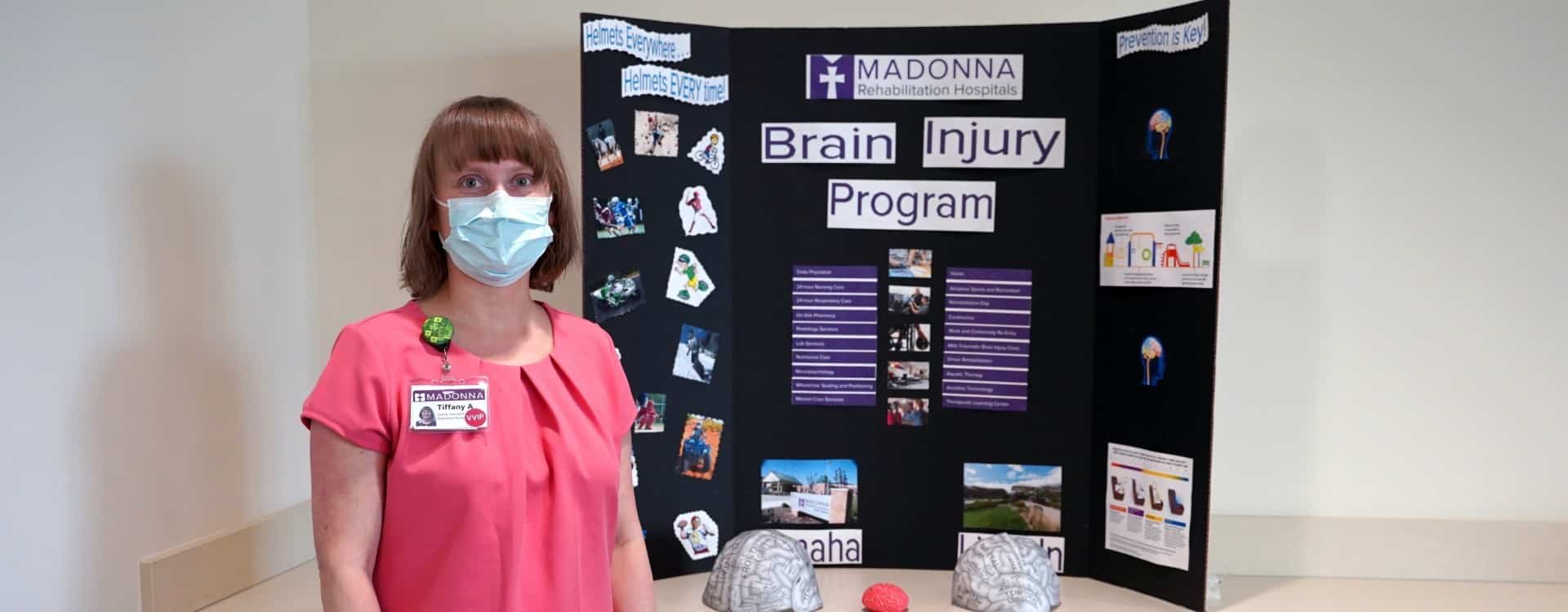A brain injury is life-changing. For Tiffany Armstrong, Madonna’s Brain Injury Program leader on the Omaha Campus, brain injury has become her life. When she isn’t serving on the Nebraska Brain Injury Advisory Council or the ACRM Chronic TBI Task Force, working to improve services and support for people with brain injuries, she’s sharing her own experiences with others as they navigate their journey.
“Originally, my college plan was pre-med,” Armstrong said. “Then, I was in my car accident.”
The accident happened on March 3, 2000. It took doctors a year and a half before she had a correct diagnosis.
“They focused on the neck pain I was having and thought that was the root of all the issues,” Armstrong said. “I did all kinds of therapies and medications, and it wasn’t helping. Finally, a neurologist told me there was nothing else they could do; I was going to live that way for the rest of my life, and I was having severe pain. I was having trouble remembering anything and concentrating leading to difficulties in school, and I was only 19.”
Thanks to a quick internet search, Armstrong found a Colorado doctor who finally diagnosed her with a brain injury. She came to Madonna’s mild brain injury clinic and worked with Gail Finsand, a speech therapist, to gain strategies to return to school. While she finally had an answer, Armstrong said she still battled fatigue associated with her brain injury, so she switched from medical school to nursing.
“I think from everything I went through and being at Madonna through some of the therapies, it led me to the rehab world,” she said. “Through nursing school, I did more rotations at Madonna, and that’s where I decided I wanted to do brain injury rehab.”
Armstrong started as a staff nurse, working on the brain injury/pediatric/burn unit. After moving to Boston, then back to Nebraska, working at different facilities, she returned to Madonna as a support staff nurse. After earning her master’s degree in nursing, Armstrong took a position as a supervisor in home health until Madonna’s Omaha Campus opened. Then she accepted a supervisor role on the brain injury unit on Madonna’s Omaha Campus and became the Brain Injury Program leader.
Her medical knowledge in the brain injury field is impressive, but Armstrong’s involvement with brain injuries doesn’t end there. She can also relate to loved ones who become caregivers, taking care of two close family members who also survived brain injuries.
“My mom had swelling on her brain from high blood pressure, and she ended up in the ICU,” Armstrong said. “When she discharged from the hospital, she required 24/7 care. Not only do I have personal experience walking in the shoes of a patient with a brain injury, but now as a caregiver, I [also] learned what it truly means to be [on] 24/7. It means you can’t even go to the bathroom unless someone else is there watching that person.”
Armstrong also cared for her cousin, who sustained a brain injury in a 2008 car accident. He came to Madonna for rehabilitation, and she served as a 1:1 monitor in his room while he navigated the early stages of brain injury, including frustration and restlessness. She keeps this in mind when she works with patients and their families. She says it helps her meet them wherever they’re at in their recovery journey.
“As an individual, I had [personal] experience, and as a caregiver, I had that family experience,” Armstrong said. “Then, entering the health care field as a nurse, I got to see all the different aspects. I think that’s what’s unique, being able to provide resources and being understanding of family members and individuals about where they’re at.”
Over the years, Brain Injury Month has represented many different things for Armstrong.
“Some years, it kind of just passes, and I’m not personally affected as much, but other years, it has been a bigger deal,” she said. “I think it’s a good thing that there’s a focus on brain injury during that month because some people don’t have that knowledge, and there’s a lot you can do to prevent a brain injury.”
Speaking in her role as Brain Injury Program leader, Armstrong says it’s important to focus on how to prevent brain injury in sports and outdoor activities. As someone who lives with a brain injury, she says it’s important to find a support system, whether through support groups, friends and family or community resources. Research has shown that people who have had a brain injury are more likely to experience depression than those who have not.
“Especially if you can remember who you were before the injury and how things are different, trying to compare the two…you can’t,” Armstrong said. “You have to accept that was the old me. I am now a new person, but that new person isn’t bad. Knowing things I used to be, things that I used to do, how can I use those experiences and that knowledge to make me a better person now?”
Armstrong uses her experience and knowledge to spread awareness while advocating for herself and others. She recommends that if you or someone you know has sustained a brain injury and is in need of rehabilitation, visit Madonna.org today for more information.





